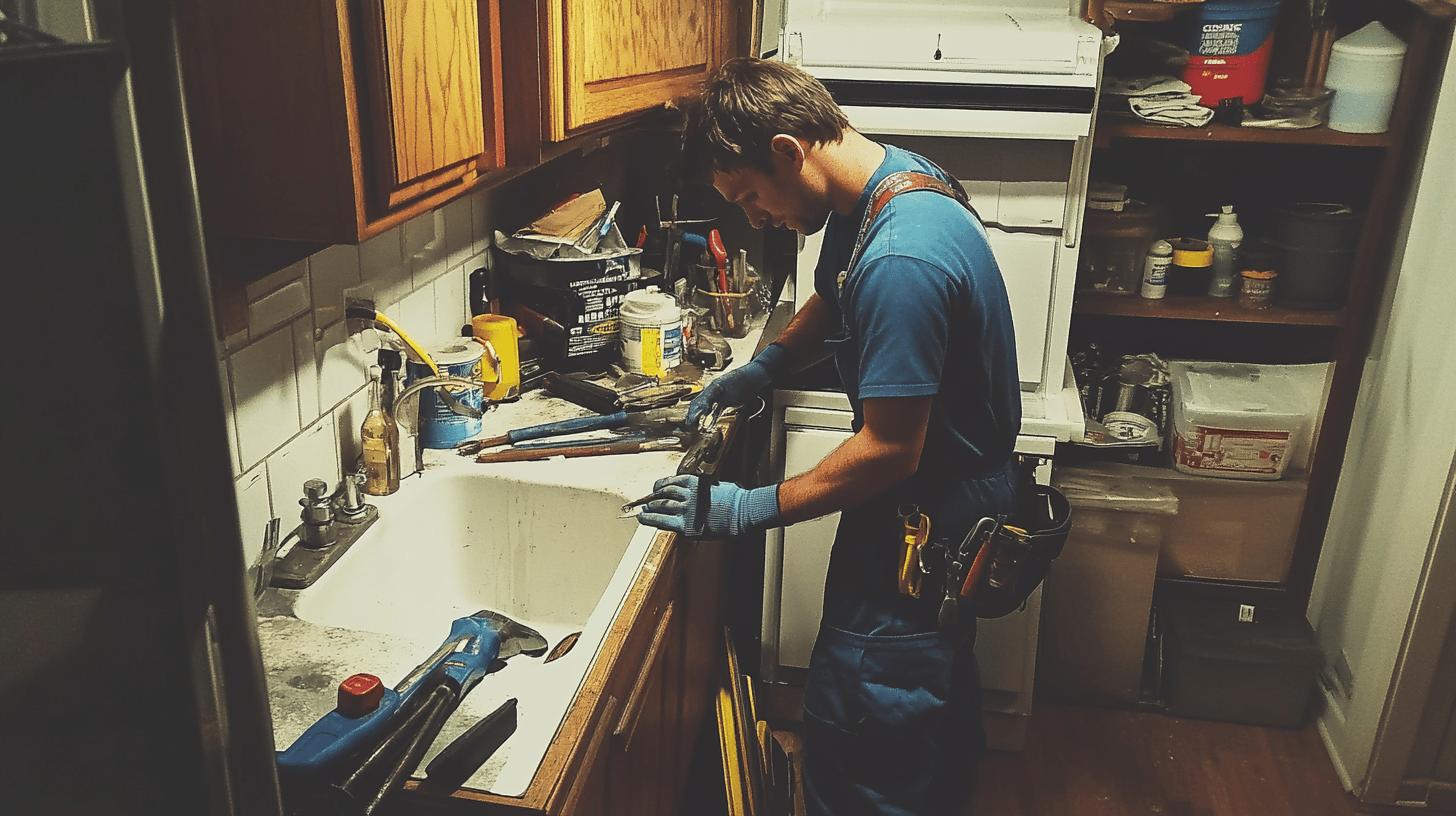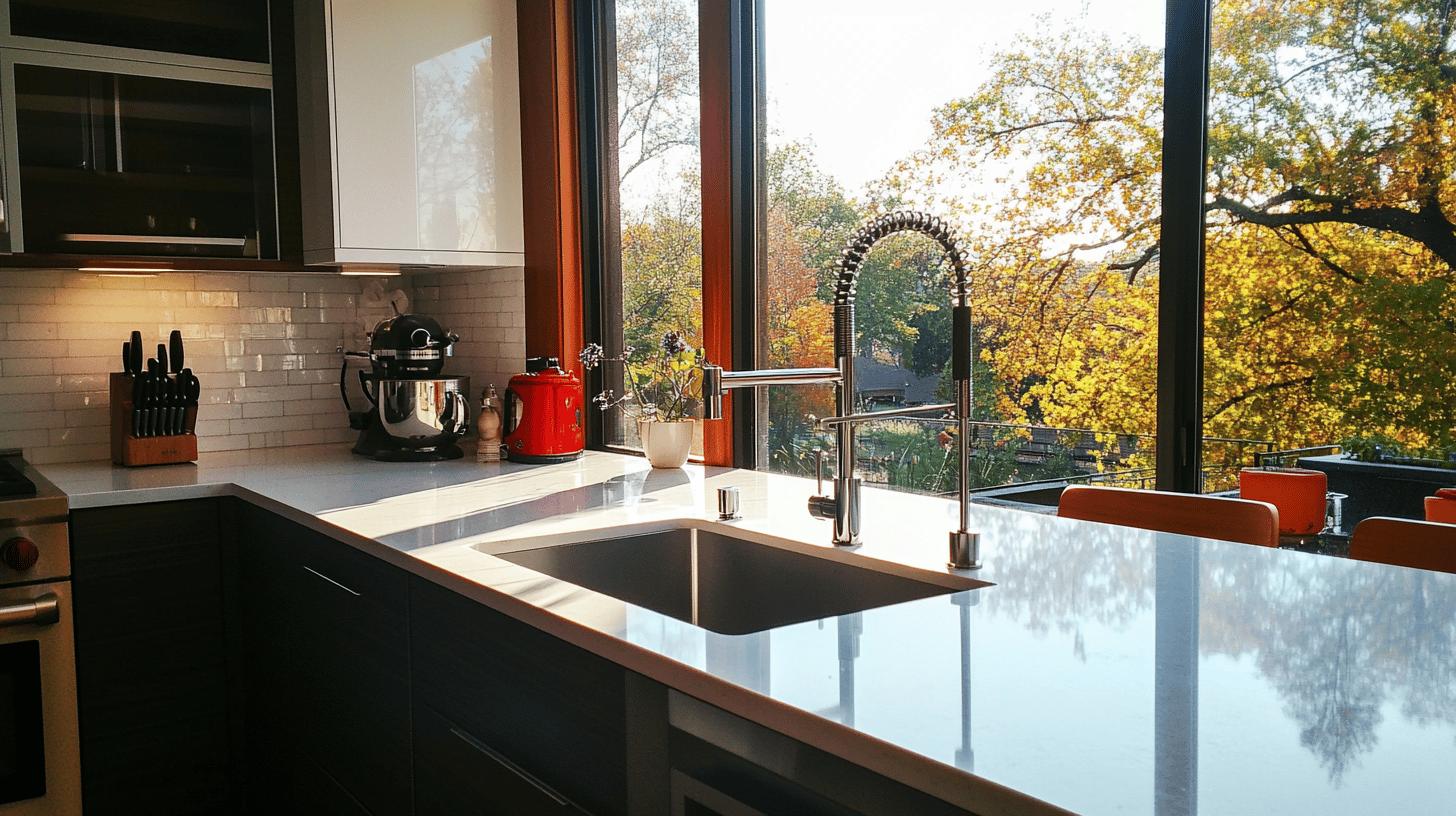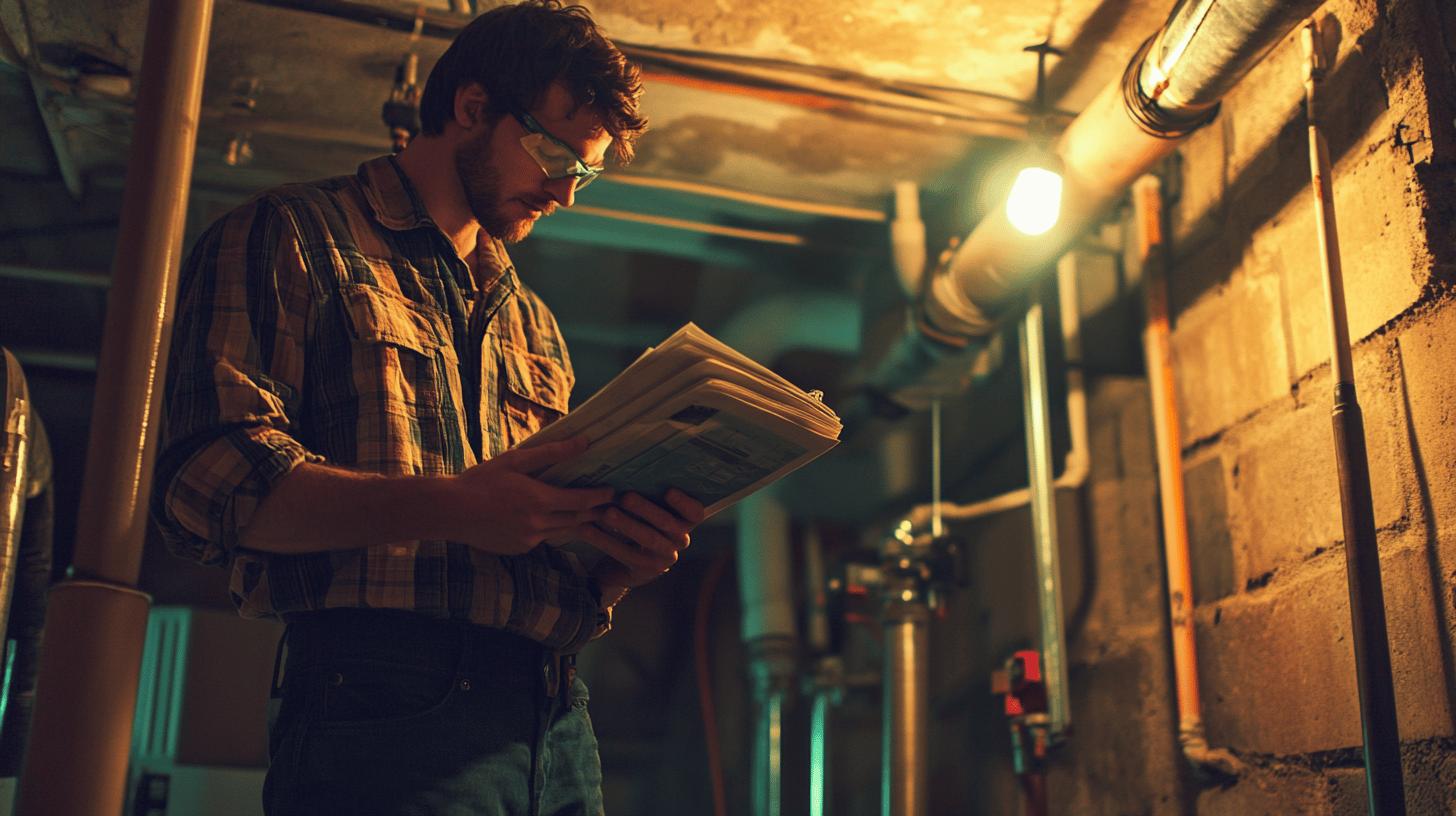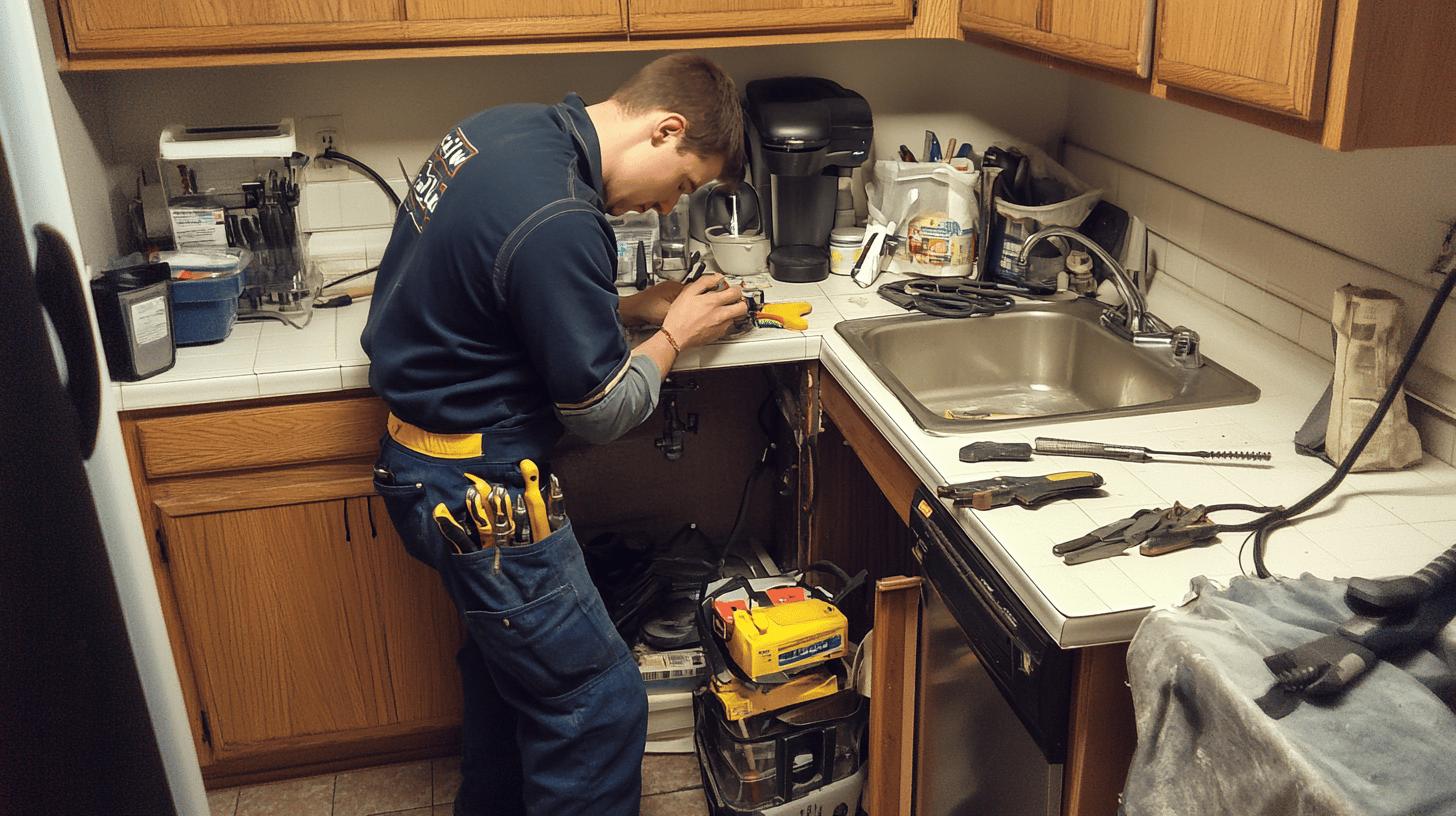TL;DR:
- Plumbing Systems: Handle water supply (potable, sanitary, stormwater) for hygiene and drainage.
- Pipe Materials: Copper (durable, antibacterial), PVC (light, non-corrosive), PEX (flexible, easy install).
- Installation Tips: Regular inspections, prompt leak repair, use plumber’s tape, avoid over-tightening, seal exposed pipes.
- Water Efficiency: Low-flow faucets, dual-flush toilets, rainwater harvesting save water and reduce bills.
- Common Issues: Leaks (detected with cameras), clogs (cleared with augers/hydro-jetting), corrosion (prevent with better materials).
- Plumbing Codes: Ensure safety via electrical separation, backflow prevention, and proper ventilation. Professional plumbers guarantee compliance and performance.
Have you noticed how a minor plumbing issue can quickly become a costly hassle? Boosting your system’s efficiency with smart practices not only saves money but also protects your home’s functionality. Understanding plumbing basics and choosing the right components can prevent problems and help conserve water. This guide will walk you through effective strategies to maintain and enhance your plumbing system’s performance. With the right knowledge, you can keep your home’s plumbing in top shape for years. Ready to dive in? Let’s get started!
Understanding Plumbing Systems and Their Components
Residential plumbing systems are intricate networks that manage water supply, drainage, and fixtures throughout the home. Supply lines deliver clean water for daily tasks like drinking, cooking, and cleaning, while drainage systems remove wastewater to keep things sanitary and safe. Fixtures such as sinks, toilets, and showers serve as key points for water use and drainage, linking everyday activities to the plumbing system.
Three common plumbing systems in homes include:
-
Potable Water Systems: These systems ensure clean, safe water for drinking and other uses. They consist of pipes, valves, and fixtures to keep water free from contamination.
-
Sanitary Drainage Systems: Essential for expelling wastewater from fixtures, these systems use pipes and vents to move waste to sewers or septic tanks, keeping your home clean and safe.
-
Stormwater Systems: Designed to manage rainwater, these systems prevent flooding by redirecting water away from your home using gutters and drainage pipes.
Understanding basic plumbing concepts can make maintenance and troubleshooting easier. Knowing how your home’s plumbing system works helps prevent issues and improves communication with professional plumbers, leading to more accurate repairs and effective maintenance.
Choosing the Right Pipes and Fittings for Longevity

Choosing the right pipe materials and fittings is essential for a lasting plumbing system. The materials used impact durability and safety, especially in water supply lines, helping prevent leaks and corrosion and ultimately saving time and money.
|Pipe Material|Uses|Advantages|
|————-|—-|———-|
|Copper|Water supply, heating|Durable, antibacterial, heat resistant|
|PVC|Drainage, waste, vents|Light, easy to install, non-corrosive|
|PEX|Water supply, heating|Flexible, easy install, resists scaling|
Quality fittings make for secure pipe connections, preventing leaks and keeping water flowing smoothly. High-grade fittings lower the risk of damage and improve system performance. Skilled plumbers use precise techniques and follow industry standards for a reliable, long-lasting plumbing setup, protecting your investment.
Professional Plumbing Tips for Installation and Maintenance
Professional installation is key for effective plumbing, ensuring pipes are aligned and fittings are secure to prevent leaks and corrosion. This boosts system efficiency and longevity. Experienced plumbers follow industry standards, reducing errors and enhancing performance.
-
Conduct Regular Inspections: Annual checks help catch issues early, preventing major repairs and extending system life.
-
Repair Leaks Promptly: Small leaks waste water and cause damage over time. Fixing them quickly keeps the system intact.
-
Use Plumber’s Tape: Known as Teflon tape, it seals pipe threads, preventing leaks. Wrap it three times around threads for best results.
-
Avoid Over-Tightening: Secure fittings without over-tightening to avoid stripped screws and broken bolts, which can affect plumbing integrity.
-
Seal Exposed Pipes: Insulate pipes to prevent freezing in cold climates and reduce condensation in humid areas, avoiding burst pipes and moisture issues.
Hiring professional plumbers for installation and maintenance keeps your system in top shape. They follow safety guidelines, delivering quality work and giving you peace of mind. Their expertise allows them to quickly diagnose and fix issues, ensuring your plumbing system remains safe and efficient for years.
Plumbing Best Practices for Water Efficiency and Conservation

Conserving water at home lowers utility bills and promotes sustainability. Installing water-efficient fixtures reduces water usage without sacrificing performance, helping you save resources and money.
Eco-friendly plumbing solutions include:
-
Low-Flow Faucets: Reduce water flow without losing pressure, saving water.
-
Dual-Flush Toilets: Offers two flush options for liquid and solid waste, saving water per flush compared to traditional toilets.
-
Rainwater Harvesting Systems: Collect and store rainwater for irrigation and non-potable uses, reducing dependence on municipal supplies.
These water-saving methods not only help the environment by reducing demand on local water supplies but also cut down on your water bills, making them both eco-friendly and budget-friendly. Investing in efficient plumbing supports a sustainable and economical home.
Common Plumbing Issues and How Professionals Address Them
Homeowners frequently encounter plumbing problems like leaks, clogs, and corrosion, which can disrupt daily activities and lead to costly repairs if not addressed promptly. Hiring professional plumbers is essential, as they bring the expertise and tools needed to provide effective and lasting solutions.
Common plumbing issues and solutions include:
-
Leaks: Detecting hidden leaks is crucial. Plumbers use tools like cameras for non-invasive inspections, enabling precise repairs and preventing more water damage.
-
Clogs: For persistent clogs, plumbers use augers and hydro-jetting, which clear blockages efficiently without harming pipes.
-
Corrosion: Combatting pipe corrosion involves recommending corrosion-resistant materials like PEX or copper. Protective coatings and inspections extend system life.
Preventative maintenance is essential for minimizing plumbing issues. Regular inspections and timely repairs help identify problems early, stopping them from worsening. Investing in professional plumbing services ensures your system remains efficient and reliable, protecting your property and providing peace of mind.
The Importance of Plumbing Codes and Safety Standards

Plumbing codes and safety standards are crucial for ensuring the safety and efficiency of plumbing systems. These regulations establish minimum requirements for design, installation, and maintenance, protecting homes from hazards. Adhering to these codes not only safeguards your property but also improves the performance and lifespan of your plumbing system.
Key safety guidelines to follow include:
-
Electrical System Protection: Keep plumbing installations away from electrical systems to prevent water contact, which poses serious safety risks.
-
Backflow Prevention: Install devices to block backflow, guarding potable water from contamination and preventing harmful substances from entering your supply.
-
Ventilation: Ensure proper drainage system ventilation to stop sewer gases from entering living spaces, safeguarding occupant health and comfort.
Professional plumbers are trained to ensure code compliance, equipped with the knowledge and experience to navigate regulations effectively. This expertise guarantees safety and optimal system efficiency, providing reliable performance and peace of mind for homeowners.
Final Words
Understanding the basics of plumbing systems is crucial for effective maintenance and troubleshooting. Knowing how water supply, drainage, and fixtures work prepares you to enhance system longevity. Choosing the right pipes and fittings boosts durability, while professional installation and maintenance protect against common issues.
Implementing best practices for water efficiency not only benefits the environment but also saves you money. Professionals are essential for addressing common plumbing challenges, ensuring that systems are safe and compliant with codes. By following these guidelines, you can maintain a reliable and efficient plumbing system.
FAQ
What is the first rule of plumbing?
The first rule of plumbing is to understand the flow direction and valve functions. Always ensure water flow can be stopped easily in emergencies.
What is the hardest thing about plumbing?
The hardest aspect of plumbing is balancing proper installation with troubleshooting complex issues such as hidden leaks or irregular water pressure.
How can I make my plumbing more efficient?
Improving plumbing efficiency involves installing water-efficient fixtures like low-flow faucets and dual-flush toilets, and ensuring regular maintenance.
How can I be successful in plumbing?
To succeed in plumbing, focus on safety adherence, acquire professional skills, and leverage modern diagnostic tools for effective problem-solving. Regular training enhances skills and industry knowledge.
What are new construction plumbing tips?
In new construction, prioritize correct pipe sizing and layout planning for optimal flow efficiency. Professional installation ensures adherence to codes and long-lasting performance.
How do you plumb a house diagram?
To plumb a house, start by mapping out the system with water supply lines, drainage, and fixture locations, ensuring connections are efficient and easily accessible for maintenance.
What are plumbing basics?
Plumbing basics include understanding water supply, drainage, and fixture functions. Familiarity with these components helps in maintenance and quick troubleshooting.
What are some plumbing principles?
Key plumbing principles are maintaining water pressure, preventing backflow, and ensuring leak-free connections. Understanding these helps maintain a reliable system.
What are the types of plumbing systems?
Common plumbing systems include potable water systems for drinking, sanitary drainage systems for waste, and stormwater systems for rainwater management.
What are the common plumbing issues?
Common issues include leaks, clogs, and corrosion. Professionals use tools like cameras and hydro jets to diagnose and fix these efficiently, minimizing recurrence.

